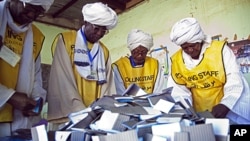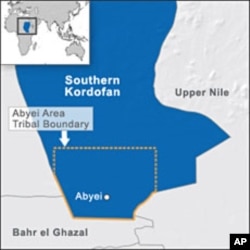Preliminary results show that southern Sudan has overwhelmingly voted to secede from the north. Sudanese government officials say they will respect that decision and officials in both the north and the south are turning their attention to the practicalities of breaking up Africa's largest country, including writing new constitutions and settling the status of Sudan's disputed oil region.
Practicing their new national anthem. Early results indicate southern Sudan will become the world’s newest nation in July.
The historic vote earlier this month came after decades of civil war. Turnout was high with voters traveling long distances and waiting hours to cast their ballots.
Independence will be challenging for South Sudan, says Africa researcher Roger Middleton, with the London think tank Chatham House. “This is going to be a landlocked country, one of the poorest in the world, very little infrastructure,” he said.
The London representative of South Sudan’s government constantly checks news from home. Daniel Othol says Africa’s newest nation will need help. “My government is doing its best really to attend to the needs of individuals, but still there is a lot of room for the international community to come to our aid,” said Othol.
There are still details to be worked out before Africa’s largest nation is divided. Southern Sudan’s borders still have to be finalized. One of the biggest sticking points is the disputed oil region of Abyei which straddles north and south. Disputes over who is resident there meant no one in the region got to vote. Negotiations continue over its status. Othol thinks there will be a solution.
“There is a lot of optimism within the presidency of Sudan that the solution will be arrived at before the 9th of July when southern Sudan will be declared an independent state,” he said.
Representatives of the Khartoum government briefed analysts and journalists here in London on their position on Abyei. “Everything in Abyei should be shared between the two communities, a northern community and a southern community,” said Aldiri Mohamed Ahmed, Sudan government negotiator for Abyei.
The south disagrees, and William Morris with the Research group the Next Century Foundation says Abyei could become a flashpoint. “The people in Abyei are not getting the chance to vote and it could become a real firecracker issue, very dangerous," he said.
Most of southern Sudan’s revenues will come from oil. Because the new country is landlocked, the south will be dependent on the north as an export route. Ibrahim Ghandour of Sudan’s ruling National Congress Party says oil will bring the two nations closer together.
“Sudanese oil is produced in north and south with the south producing almost 76 to 80 percent of the total input. And while that is the case, all the infrastructure is in the north,” he said.
Continuing unrest in the western region of Darfur presents another potential problem for southern Sudan. It shares a border with Darfur where fighting has displaced millions since it began in 2003.
Southern Sudanese who fled to the north years ago may move south now that there is peace. No one knows how many will choose to do so. Many challenges remain and southern Sudan’s independence has yet to be formally declared. But these young men are so confident of the outcome, they already have southern Sudan’s national anthem on their phones.





